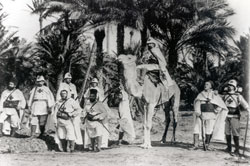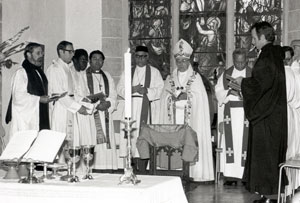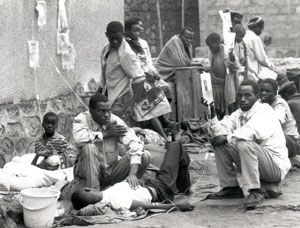

 |
 |
| WCC work on DOV focuses on four themes
In an attempt to stimulate reflection and action around the Decade to Overcome Violence, the WCC has identified four themes on which to focus its own contribution to the next four years of the Decade . A study document explaining the meaning and implications of these themes for use by churches and others will be ready by July 2002.
The spirit and logic of violence
Violence is often legitimized by the prevailing norms, values, belief systems, cultures and structures of relationships in our societies. For example, the assumption that human beings are by nature evil and have the propensity to be violent has justified the creation and continuation of highly repressive regimes and traditions. Another assumption that some human beings are inferior to others has justified and continues to justify violence against certain sections of the people in every place all over the world. There is also the assumption that violence is a divine attribute, and this has justified acts of human aggression in the name of God and "justice". The doctrines of redemptive violence, the theories of just war and the recent holy war, and the legacies of the crusades and colonisation, have their roots in these assumptions.
Religious interpretations are often used to justify and legitimise violence. We therefore must ask: How can the churches overcome the spirit and logic of violence within and around? What alternatives can the churches offer from their understanding of scriptures and traditions in a world torn apart by many forms of violence? |
 Colonization and mission: 19th century group of missionaries of the Societé des Pères blancs armed to protect missionary caravans in Africa |
| The use, abuse and misuse of power
Any discourse on violence must acknowledge the role of power in all manifestations of violence. Violence, after all, is an irresponsible exercise of power over the powerless or retaliation to such power. Sometimes it is the fear and glorification of power that encourages violence and inhibits the oppressed from resisting violence. By and large, the abuse of power has become an accepted way of exercising power. Power concentrated in the hands of one or a few - whether political, economic, social or spiritual - "corrupts, and corrupts absolutely", dehumanising people and destroying relationships. Power in the hands of the socially and economically privileged has the propensity to become a force of death and dehumanisation.
Furthermore, power is also an important element in the life and structures of the church. It is glorified, venerated and feared, and consequently concentrated in hierarchical church structures. Such notions of power have compelled churches, in many places and times, to maintain neutral positions whenever power was abused, despite the teachings of the church on issues of justice, witness, and identification with marginalised people. With such inner contradictions, how do churches relate with their own structures of power as they seek to survive and grow, while also trying to be faithful to the imperatives of the gospel? In issues of power abuse within church, whose side will the churches take? What are the alternative ways by which the churches can redefine power? How can they remain and become communities instead of power structures? |
 Hierarchical structures within the church |
| The issues of justice
One cannot hope for a lasting peace without striving for justice. The general trend of many peace initiatives has been to focus on peacemaking and neglecting the need to uphold justice. It is the unjust desires of the powerful and the denial of justice that makes the victims resort to violence. Peace and justice cannot be pursued separately because violence is rooted in injustice.
Furthermore, exclusion and oppression, in whichever form they exist, are both injustice and violence. The economic structures and policies, which cause enormous human suffering, depravation, poverty, homelessness, unemployment; and the social structures and values which nurture inhuman practices, are also forces and forms of violence. The greed of a few which destroys the environment is also a form of violence of the powerful.
Overcoming violence implies overcoming the root causes of violence. Such a pursuit also implies standing alongside certain sections of people who often suffer from multiple forms of violence because of the unjust social and economic structures. Included in this pursuit is the struggle for restorative justice. Healing the memories of violence, dealing with the challenge of impunity, and striving for reconciliation based on truth and justice are important challenges ahead of the DOV process. As the churches commit themselves to this journey of peace, the biblical imperative of seeking justice must be allowed to challenge: How do we make justice the guiding value? How do we reclaim the centrality of justice in the affirmation of Christian faith? How do we preach nonviolence to violent social, economic and political structures? How do we relate with those struggling for justice? |
 Drugs, despair, homelessness |
| Religious identity and plurality
In an increasingly pluralistic world characterised further by processes of economic polarisation at the micro- and macro- levels, the assertion of identities - religious, ethnic, linguistic, social - has become a cause of conflict and violence between and among communities. Conflicts arising out of such assertions are going to turn violent in many parts of the world. Identities do not only evoke sentiments and loyalties but also operate as instruments in the pursuit of power and justice. Political, social, and religious hegemonic powers often manipulate the sentiments around identities. Even the much-dreaded terrorism, as a form of violence is committed for reasons that are centred around identities, whether patriotic, ideological, revolutionary, or reactionary. Religious fanaticism, which thrives on the sentiments that religious identities nurture, is threatening to divide communities and cause large-scale violence of sorts.
In such a situation, how do churches witness to their faith in God who heals, reconciles and unites? How can the churches provide a trans-denominational and trans-religious presence and witness in a divided world? The DOV provides an opportunity to the churches to rethink the realities of their denominational presence, ambiguous positions, and exclusivist claims. Interfaith dialogue has been identified as an important means towards this end. But the challenge for us is to explore further to identify possibilities that are people-based and effective in healing and building communities.
Please send us an e-mail if you have any questions or would like more information. |
 Rwandans who fled their country after the ethnic genocide of 1994 sought food and shelter in Goma, Zaire |
Decade to Overcome Violence P.O. Box 2100 1211 Geneva 2, Switzerland Telephone (41.22) 791 60 42 Fax (41.22) 791 64 09 E-mail: DOV |